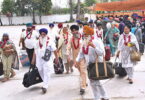Rifaqat Ullah Razarwal
CHARSADDA: Every year on February 21, International Mother Language Day is celebrated all over the world, including Pakistan, with the aim of highlighting the importance of the mother tongues, getting educated and promoting regional culture based on them.
On the occasion of International Mother Language Day, Dr. Khadim Hussain, Culture Director of Awami National Party, told to The Frontier Post that celebrating this day as mother tongue is a great tradition, it not only preserves the identity of a nation but also It is also the backbone of our culture.
Dr. Khadim Hussain said that linguists all over the world agree that mother tongue is an important medium of mass communication and through it collective wisdom is easily transmitted. He said that without mother tongue, creation, invention, thoughts and research for solving problems and formation of collective institutions like court, politics, journalism, market is not possible. When Dr. Khadim was asked about that why getting primary education is important in mother tongue? He said that based on mother tongues, it is easier for children to learn other languages and their sense of ideas and thoughts is enlightened.
“It is not necessary for the child to be taught English and Urdu in the beginning so that he can master these languages later on, but my observation is that when a child receives his early education in his mother tongue, he can easily understand other languages as well. Dr. Khadim Hussain said that Pashtuns are a strong and powerful nation because their Pashto language has a history of five thousand years and every nation is considered a nation as long as it preserves its history, culture, mother tongue and geography.
According to the United Nations, there are currently 6,000 languages spoken in the world, of which 43% are on the verge of extinction, which not only destroys the identity but also embraces the culture of the region. The UN has rated only several hundred languages for use in the education system and in everyday life, and according to them, about 100 languages are used in the digital world.
According to a report released by United Nation Education Scientific Culture Orgarnisation (UNESCO), 240 languages have disappeared since 1950. Why is February 21 celebrated around the world as International Mother Language Day? ”
On February 21, 1999, the UNESCO declared the same day as Mother Tongue, when on February 21, 1952, the Jagnnath University and Dhaka Medical College in East Pakistan Students from colleges and other educational institutions started a movement to retain their education in their mother tongue’ Bengla’ and as a result of that movement they were fired upon by the police and many students sacrificed their lives. Why is early education for children important in their mother tongue?
In this regard, Dr. Sohail Khan, Chairman of the Pashto Department of Abdul Wali Khan University Mardan (AKUM) and author of eight books, said that educationist, scientists and researchers from all over the world agree that whatever factors contribute to the attainment of education and the promotion of thought. They are not possible without mother tongues.
Citing a World Bank research report, Dr Suhail Khan said that if children were educated in their mother tongue, it could lead to a positive change in children’s attitudes and “this is the real purpose of education”. “If education is not in the mother tongue, we can call it information and the same process can be done easily through digital devices today, but children will be deprived of the process of learning,” he said.
According to Dr. Sohail, the government set a target of making citizens 100% educated from 1992 to 2000, while the same policy was repeated from 1998 to 2010, but according to research, these targets could not be achieved because primary education was not given in the mother tongue. Suhail Khan said that the factual secret of development of developed nations around the world, they have received primary education in their mother tongues. He said that Pashto language has a history of thousands of years and there are many opportunities to move forward in this language if attention is paid to it at the government level.






